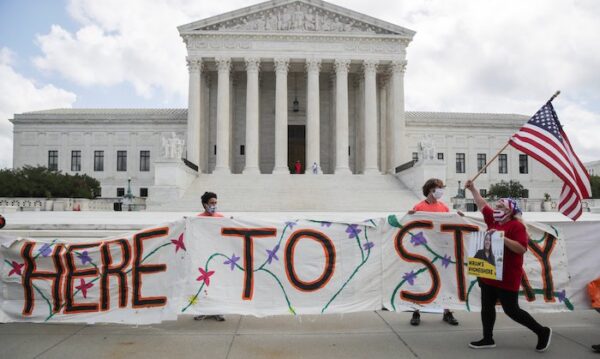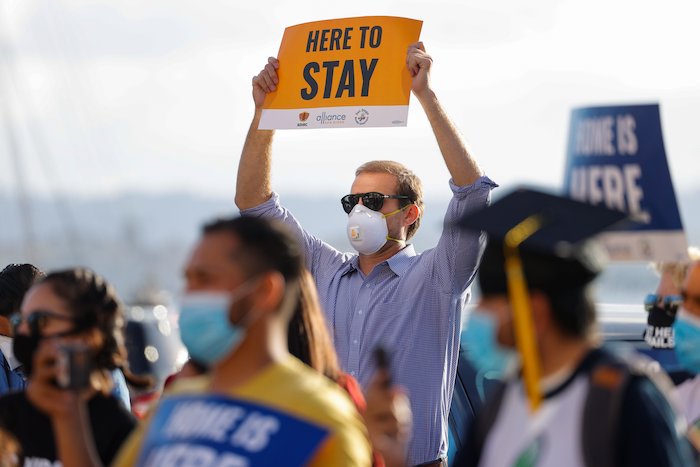
NEW YORK — Before Daniela Alulema became a Deferred Action for Childhood Arrivals (DACA) recipient in 2012, she remembers the hardships and uncertainty she experienced as a completely undocumented college student.
Now, on the heels of a federal judge ruling the program is unlawful — preventing any prospective recipients from the protection — Alulema is disappointed for the tens of thousands of undocumented immigrants with pending applications who are now stuck in limbo.
“As a young person who went to college in the first years of my twenties, completely undocumented, I know how challenging and how depressing it can be not to have the ability to plan, the ability to look forward, and the ability to dream big,” Alulema, originally from Quito, Ecuador, and now the director of programs for the Center for Migration Studies, told The Tablet.
Texas federal judge Andrew Hanen ruled against DACA Friday afternoon. The Obama-era program protects undocumented immigrants brought to the country as children — known as “Dreamers” — from deportation, and it provides them work eligibility for renewable two-year periods.
Friday’s ruling does not affect the more than 640,000 current DACA recipients, but it bars the government from approving any new or pending applications. Hanen found that the program was created illegally by former President Barack Obama in 2012 by violating the Administrative Procedure Act, which governs the process by which federal agencies develop and issue regulations.
The program was created by Obama through executive action, and it was intended to be a temporary stopgap measure until Congress passed immigration reform.
Like Alulema, immigration advocates and Catholic leaders were disappointed by Friday’s ruling, albeit not surprised, as this decision was always possible because of how the program was created. They view the decision as a “wake-up call” to Congress that immigration reform is needed.
“While we are disappointed with this ruling, we know that DACA was never meant to be a permanent solution for Dreamers,” Auxiliary Bishop Mario Dorsonville of Washington, the chair of the U.S. Bishops Conference committee on migration, said in a statement. “This ruling is simply the most recent development in a long list of events warranting action by Congress.”
Bishop Mario E. Dorsonville, Migration Chairman, Urges Congress to Act After Court Ruling on #DACA. Full statement: https://t.co/RZvOmWi5mk pic.twitter.com/105QBUuKRN
— U.S. Conference of Catholic Bishops (@USCCB) July 19, 2021
“My brother bishops and I urge the Senate to join the House of Representatives in passing legislation that would provide legal status and a path to citizenship for all Dreamers,” he added.
In a conversation with The Tablet, Archbishop John Wester of Santa Fe decried the politicization of the issue and what he calls “a big abyss” between the two sides, especially because of the effect it has on young people.
“These young people are like a ping pong ball, depending on what political party is in power at a certain time and they get batted back and forth. In the meantime, they’re living in the shadows and that’s really wrong and goes against all of our common sense and our goodwill and certainly, it goes against our Catholic social teaching,” Archbishop Wester said. “Congress needs to step up to the plate and get something done.”
Likewise, Bishop Mark Seitz of El Paso said the government needs to realize what they’re putting these young people through that are in the U.S. through no fault of their own.
“They’re being tossed back and forth,” Bishop Seitz told The Tablet. “They can stay, they can’t stay. There’s a path, there’s not a path to citizenship. Their lives are in constant turmoil and uncertainty and insecurity. No one should have to live that way.”
President Joe Biden, the nation’s second Catholic commander-in-chief, expressed his disappointment with the ruling after it was announced and said that the U.S. Department of Justice intends on appealing the decision.
Once filed, the appeal goes to the Fifth Circuit Court of Appeals. If it upholds the decision, then it’s up to the Supreme Court to choose whether or not to hear the case and subsequently rule.
Archbishop Wester said he’s “grateful” for the appeal, but again, understands that even if the appeal is won what’s needed is legislation from Congress. Bishop Seitz noted that nothing except legislation can resolve this issue.

“We all acknowledge that executive orders and the like are not going to resolve this issue,” Bishop Seitz told The Tablet. “Saying that we’re going to provide better discretion is by its very definition an incomplete solution. We need legislation.”
Fred Tsao, senior policy counsel at the Illinois Coalition for Immigrant and Refugee Rights, told Crux that another reason immigration legislation is needed is that Hanen could’ve, and any judge still can still wipe out the program entirely.
Hanen acknowledged in his opinion that hundreds of thousands of individual DACA recipients rely on the program, and therefore “it is not equitable for a government program that has engendered such significant reliance to terminate suddenly.”
Alulema said she lives every day with the understanding that her fate is out of her control.
“I’m in my thirties now,” Alulema, who will be 20 years living in the U.S. next month, told The Tablet. “This is a time when many of my peers are achieving life milestones and, as someone with DACA and still in a limbo, I’m very afraid of making any drastic decisions because I don’t know what’s going to happen to my status two years from now.”
“Being a DACA recipient creates a lot of anxiety,” Alulema continued. “A lot of uncertainty. I’ve had to rely on my faith to make it through because sometimes this uncertainty can be extremely overwhelming.”
She offered a plea to Congress to take action.
“We have shown time and time again that we are truly Americans. We have shown in many different ways that we are committed to this country,” Alulema said. “We want to stay. We want to contribute, but we want to do it in a way that provides stability, certainty, and allows us to be full participants in the country that we consider our home.”
